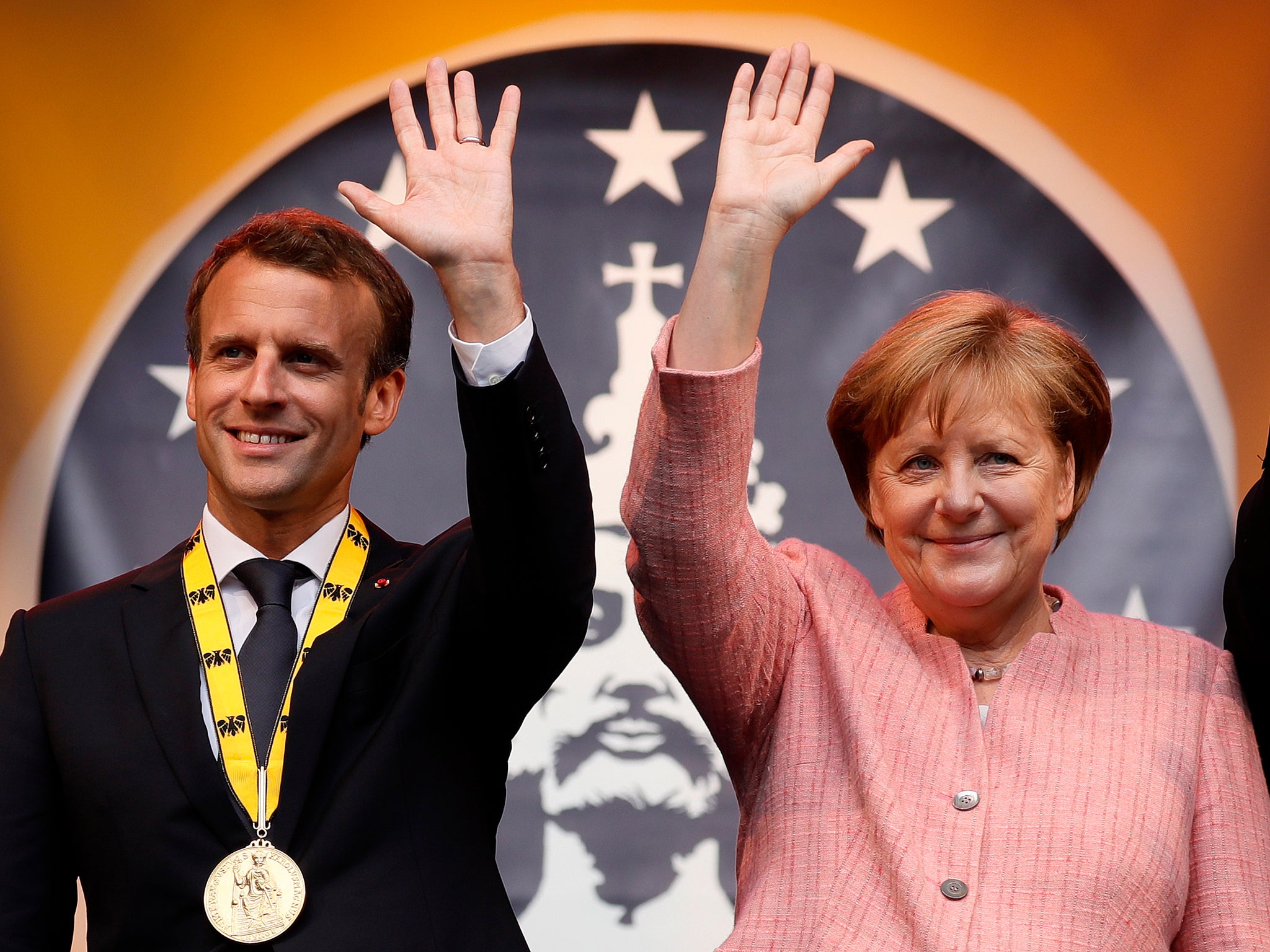Today Emmanuel Macron received the Charlemagne prize – but I'm not really sure he deserves it
The French president’s Sorbonne speech last September repays study as the most lyrical endorsement of ‘ever more Europe’ any EU leader has put forward in decades. But can he deliver?


Today President Macron was in Aachen (or Aix-la-Chapelle as the French call it) to receive this year’s Charlemagne prize from Angela Merkel, the German chancellor. As the name suggests the prize is bestowed by the burgers of Aachen to reward pro-European enthusiasm. There have been five British laureates from Winston Churchill to last year’s winner, Guardian columnist and pro-European essayist, Timothy Garton-Ash. The prize money is modest but there is a very large medal that can be worn around the neck.
I went with Tony Blair when he was awarded the prize in 1999. The winner the year after was Bill Clinton, who isn’t European, but Henry Kissinger won it in 1987 and he, at least, was born in Europe. The Pope, who comes from Argentina, has won it as did the euro in 2002 – surely the first time in international prize awards history that a bank note has been so honoured? – and so have the people of Luxembourg. It is not quite clear why the grand duchy best known as the EU’s principal brass plate tax haven got the award in 1988 but in general the prize goes to the great and the good of European partnership and cooperation.
Ted Heath, a previous Charlemagne prize recipient, came for the award to his prime ministerial successor, Tony Blair, and the two occupants of 10 Downing Street can reasonably claim to be the most pro-European prime ministers Britain has had. Arguably Margaret Thatcher had a much bigger influence on European integration with her focused campaign to abolish national vetoes and create the single market with its four freedoms of movement of capital, goods, services and people. She also presided over significant enlargements of the European community to take in the much poorer nations of Spain, Portugal and Greece, thus creating what is called Club Med Europe or the Pigs – including Ireland – where public finances came close to collapse after the 2008-09 financial crash.
If the enlargements to ex-communist Europe of 2004 and 2007 put huge pressure on existing EU members because of the free movement principle – arguably the single biggest reason for the Brexit referendum vote – the enlargement to Mediterranean Europe strongly supported by Thatcher continues to put pressure on EU finances, with most of the northern EU member states from Germany to Finland, from the Netherlands to Denmark, objecting strongly to the idea of a “transfer union” with their taxpayers bailing out dodgy, often corrupt, tax-avoiding, unreformed Club Med economies.
Of course Thatcher ended up as a Brexiter avant la lettre. In the recently published diaries of Patrick Wright, who was permanent under-secretary at the FCO between 1986 and 1991, he records in Thatcher’s last days in office her telling a colleague, “I hate Europe.” So there is no Charlemagne prize for her.
Blair instead asked Ted Heath along and he was in a stupendously grumpy mood, turning his back on all the other UK team, sitting in his open shirt over a coffee refusing to acknowledge anyone else’s existence. The event is very Roman Catholic with a high mass in Aachen Cathedral in front of the remains of Emperor Charlemagne. It was not called the Treaty of Rome for nothing, and when one listens to the hostility of DUPers against any compromise with Ireland more than a whiff of “No Popery” is there in their voices.
But as with the prize for Blair barely two years after his arrival in No 10, the prize for Emmanuel Macron is premature. Blair certainly wanted to make Britain more at ease with Europe. But he stayed out of Schengen, promised a referendum on the euro which effectively nixed any idea of entering the single currency (Gordon Brown’s five economic tests were a red herring to play for time as no one in government thought for a second Blair would risk a referendum), and also conceded a referendum on the EU constitution which was a way of killing it – though, luckily for him, the French and Dutch did the business before it was necessary.
Macron is even more pro-European than Blair and most Charlemagne prize-winners. His Sorbonne speech last September repays study as the most lyrical endorsement of “ever more Europe” any EU leader has put forward in decades.
But can he deliver? The vibes from Berlin and most northern European countries are negative without listening to the anti-Brussels diatribes from Budapest and Warsaw.
Like Barack Obama getting the Nobel Peace Prize at the start of his presidency, perhaps the Charlemagne prize should be reserved for those with a record of real EU achievement rather than the promise of ever more Europe which never gets delivered.
Denis MacShane is the UK’s former minister of Europe. He is author of ‘Brexit, No Exit. Why (in the End) Britain Won’t Leave Europe’
Join our commenting forum
Join thought-provoking conversations, follow other Independent readers and see their replies
Comments
Bookmark popover
Removed from bookmarks